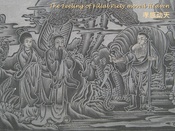It is quite interesting how sudden a particular dynasty gets replaced by another in a blink of an eye. It is also quite interesting to sit back and view the various changes being taken place, whether it calls for drastic measures or simply leaving things the way they are. Perhaps changes will allow for improvement and create a better society for all. But, if things are done one way and results are satisfactory, why change a good thing? Koryo, a dynasty founded and ruled by a military commander named Wang Kon (T'aego), did just that. It kept many of the female-centered features of Silla's social system, which will be discussed in the following paragraphs. (Kim, p11) During the declination of the Silla dynasty and the formation of the newly developed Koryo dynasty, social changes were minimal while the position of women remained quite similar in accordance with their family lifestyles, social class, governmental laws and rights, and as well, their cultural traditions.
Within the family lifestyles, the roles of a daughter, a wife, and a mother in both the Silla and Koryo dynasty remained relatively alike. In both dynasties, the women's position depended greatly on the status of her father, husband, and/or son. As a daughter, her duties were to respect her parents and help her mother with responsibilities such as household chores. As a wife and a mother, she had to take full responsibilities in the family by educating her children, managing a home, and other duties. As well, she was expected to manage the family's finances. Furthermore, as a virtuous wife, she must remain chaste for the rest of her life if her husband passed away. As discussed in the chapter of The Social System, "Filial piety was the prime virtue by which family lineage was...


